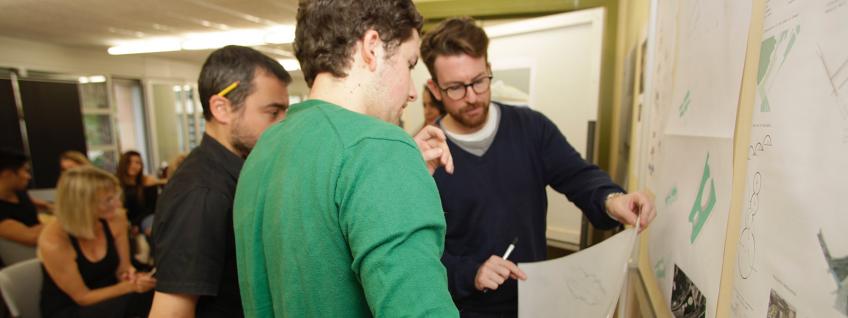Lessons on campus
This method is based on continuous assessment, practical laboratory sessions, seminars, teamwork, case analysis, class discussions, and examinations.
Students manage various projects and apply theoretical concepts to practical cases. They also participate in many projects together with other students from the Engineering, Business Management, and Architecture departments.
Blended learning
Blended learning combines in-person, on-site sessions with e-Learning. This system makes it possible to combine both studies and professional activity.
Online
At La Salle, we believe that virtual and multimedia teaching is key in meeting the increasing demand from many professionals who are currently working but who also wish to participate in real projects. To meet this need, the programmes we run on the Open Campus environment provide online education with a learning process that has students performing all kinds of tasks. It is a pedagogical model based on the Learning by Doing system: at La Salle, we call it the Scenario-Centred Curriculum.
Thanks to the Online Open Campus platform, we provide this innovative training in the fields of both Business and Computing. Our Open Campus programmes simulate the implementation of a project in which different roles are played and students collaborate with their online classmates in a global environment.
From the very beginning of the programme, each student is placed in a specific scenario with their online classmates. For each assigned role, there are a series of projects that are developed alongside experts currently active in their field, who will advise students throughout. In order for students to carry out these projects, which are supervised with the support of a tutor, there are support materials, videos, bibliography, and links available for teaching purposes. These resources are based on the various learning objectives, the competences that the students want to develop, and their previous knowledge.
Recorded lessons
The online system of some programmes at La Salle uses video recordings of in-person, on-site lessons that are then made available for students to access via the Internet. This means they can enjoy the advantages of being in a classroom without having to be there physically, ideal for students who cannot adapt their schedule to a specific lessons' timetable. Each student receives personalised care from both an online tutor and an academic coordinator.
SMART LEARNING
A NEW EDUCATIONAL MODEL FOR A NEW NORMAL
This new normal requires a new way of teaching and learning, adapted to a changing and uncertain situation that demands flexible, intelligent and technological learning that adapts to all the students’ new educational needs.
La Salle Campus Barcelona - Ramon Llull University endorses the new Smart Learning model and takes another step in its innovative DNA, affecting all areas of the educational process: the service to the students, international exchanges, remote internships, the telework model applied to internships with companies, the job bank and research projects.
What is the new Smart Learning model?
State-of-the-art technology has been implemented in the classrooms that will allow students, both national and international, who cannot get to the Campus to attend and participate in classes without being physically in the classroom. The sessions given with on-site students will be broadcast live over the Internet and those who attend virtually will be projected on screens so that teachers and on-site students can see and interact with them. All students, both on-site and those who cannot come to the campus, will form a single group while maintaining the same academic schedule and contact with their classmates and teachers.
With the new Smart Learning model, students will have a training which will be:
- Personalized, because it adapts to the student and their needs or circumstances, regardless of the health scenario.
- Flexible, because it overcomes the barriers of the online or face-to-face methods with a platform that allows face-to-face, blended and distance learning.
- Intelligent, because it is a new way of teaching and learning that combines physical and interactive experiences.
- Technological, in order to implement the Smart Learning methodology, classrooms have been transformed into Smart Classrooms, which consist of:
- Audio system with more than 8,000 virtual microphones per classroom
- Cameras equipped with artificial intelligence
- Smart Boards to share content to and from the Smart Classroom, enhancing collaborative work.
Smart Learning on a Smart Campus
Work has also been done to adapt all the infrastructures to create a Smart Campus (classrooms, laboratories, incubator, research infrastructures, common areas, services, student residence, fitness center, gardens ...) so that they are also sustainable and environmentally friendly spaces. Temperature controls, hand sanitizer dispensers, special soaps have also been installed, and cleaning protocols have been increased and modified, among other measures.
At La Salle - Universitat Ramon Llull we make every effort to offer students quality education and a university experience without barriers, wherever you are.
